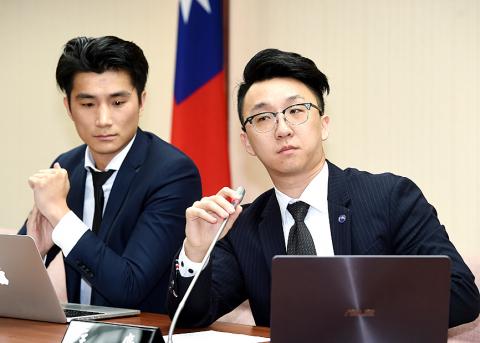Lawyers representing Yu Chen-chung (尤振仲), conductor of Puyuma Express train No. 6432 that derailed on Oct. 21 in Yilan County, yesterday said that Yu rejected the government’s claim that his negligence caused the train to speed, which in turn caused the deadly incident.
Yu said that there are differences between his account and two reports released by an Executive Yuan investigative task force last month and earlier this month, which said that a series of mechanical malfunctions on the train and poor troubleshooting by the conductor and the Taiwan Railways Administration (TRA) dispatch control room were to blame for the derailment near Sinma Station (新馬) that killed 18 people and injured 273.
“I do not accept the charge that human negligence caused the train to speed,” a statement issued by Yu through his lawyers read, after the driver was advised by a doctor to avoid further public exposure.

Photo: Fang Pin-chao, Taipei Times
This month’s report said that Yu because of power problems turned off the automatic train protection (ATP) system that prevents the train from speeding after it left Dasi Train Station (大溪), 44km north of Sinma.
Yu did not deny deactivating the ATP, but said that the report is incorrect in stating that he had been speeding and “left the speed command gear at 140kph” after the train left Luodong Station (羅東), 9km north of Sinma.
The train continued to travel at that speed, nearly double the limit, as it entered a curve near Sinma, the report said.
However, Yu said that he remembers keeping the speed at about 82kph after the train passed Wulaokeng Bridge (武荖坑橋), about 1km north of Sinma.
“Yu said he did not speed at any moment during the journey,” said his lawyer, Chen Hsiang-chuan (陳湘傳), adding that it did not occur to Yu that the train might be speeding because he had not increased the speed himself.
Some time after the train passed Luodong Station, Yu made a final attempt to reset the air compressors, which he and train dispatchers considered to be the cause of the power problems.
He then found that the train was speeding and attempted to stop it, said another of Yu’s lawyers, Alex Yen (閻道至).
The report made no mention of Yu applying the brakes, Yen said, while declining to give the exact sequence of Yu’s efforts to slow down the train or his awareness of it speeding, because they are “part of the communication records not released by the authorities.”
The only thing that is certain is that “Yu had very little time to respond properly after realizing that the train was speeding,” Yen said.
Yen urged the task force to release audio communication records and investigators’ interviews with Yu.
The report includes text communication records, but no post-accident accounts from Yu.

Chinese Nationalist Party (KMT) Chairman Eric Chu (朱立倫), spokeswoman Yang Chih-yu (楊智伃) and Legislator Hsieh Lung-chieh (謝龍介) would be summoned by police for questioning for leading an illegal assembly on Thursday evening last week, Minister of the Interior Liu Shyh-fang (劉世芳) said today. The three KMT officials led an assembly outside the Taipei City Prosecutors’ Office, a restricted area where public assembly is not allowed, protesting the questioning of several KMT staff and searches of KMT headquarters and offices in a recall petition forgery case. Chu, Yang and Hsieh are all suspected of contravening the Assembly and Parade Act (集會遊行法) by holding

PRAISE: Japanese visitor Takashi Kubota said the Taiwanese temple architecture images showcased in the AI Art Gallery were the most impressive displays he saw Taiwan does not have an official pavilion at the World Expo in Osaka, Japan, because of its diplomatic predicament, but the government-backed Tech World pavilion is drawing interest with its unique recreations of works by Taiwanese artists. The pavilion features an artificial intelligence (AI)-based art gallery showcasing works of famous Taiwanese artists from the Japanese colonial period using innovative technologies. Among its main simulated displays are Eastern gouache paintings by Chen Chin (陳進), Lin Yu-shan (林玉山) and Kuo Hsueh-hu (郭雪湖), who were the three young Taiwanese painters selected for the East Asian Painting exhibition in 1927. Gouache is a water-based

Taiwan would welcome the return of Honduras as a diplomatic ally if its next president decides to make such a move, Minister of Foreign Affairs Lin Chia-lung (林佳龍) said yesterday. “Of course, we would welcome Honduras if they want to restore diplomatic ties with Taiwan after their elections,” Lin said at a meeting of the legislature’s Foreign Affairs and National Defense Committee, when asked to comment on statements made by two of the three Honduran presidential candidates during the presidential campaign in the Central American country. Taiwan is paying close attention to the region as a whole in the wake of a

OFF-TARGET: More than 30,000 participants were expected to take part in the Games next month, but only 6,550 foreign and 19,400 Taiwanese athletes have registered Taipei city councilors yesterday blasted the organizers of next month’s World Masters Games over sudden timetable and venue changes, which they said have caused thousands of participants to back out of the international sporting event, among other organizational issues. They also cited visa delays and political interference by China as reasons many foreign athletes are requesting refunds for the event, to be held from May 17 to 30. Jointly organized by the Taipei and New Taipei City governments, the games have been rocked by numerous controversies since preparations began in 2020. Taipei City Councilor Lin Yen-feng (林延鳳) said yesterday that new measures by